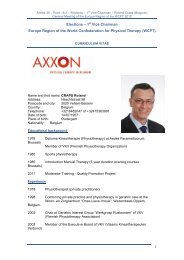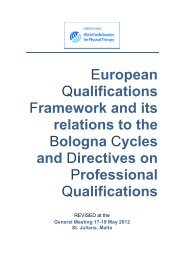Draft annotated agenda meeting prof orga 2910_V6clean
Draft annotated agenda meeting prof orga 2910_V6clean
Draft annotated agenda meeting prof orga 2910_V6clean
You also want an ePaper? Increase the reach of your titles
YUMPU automatically turns print PDFs into web optimized ePapers that Google loves.
EUROPEAN COMMISSIONDirectorate General Internal Market and ServicesKNOWLEDGE-BASED ECONOMYProfessional qualificationsBrussels, 08.10.10MARKT.D.4 (2010) 747350SECOND MEETING WITH PROFESSIONAL ORGANISATIONSON THE EVALUATION OF THE PROFESSIONAL QUALIFICATIONS DIRECTIVEAnnotated <strong>agenda</strong>Meeting of 29 October 201009:00 – 09:30 Registration09:30 – 10:00 Introduction by the Commission: state of play of the evaluationWelcome of the participantsOverview of the completion of the first phase of the evaluation and possible nextsteps towards a final evaluation report and a possible Green Paper in autumn2011.10:00 – 11:15 Session 1 - Temporary mobility: potential yet to be unlocked11:15 – 11:30 Coffee breakDirective 2005/36/EC allows for such mobility without prior check of thequalifications for most of the <strong>prof</strong>essions. However, Member States may ask forprior declarations, for <strong>prof</strong>essionals willing to provide services in other MemberStates on a temporary or occasional basis. Despite the efforts at simplification,the interest in using this new regime seems to be limited.Possible discussion points:What is the degree of interest of <strong>prof</strong>essionals in providing services on atemporary or occasional basis in other Member States? Does the new regimemeet the economic needs of the <strong>prof</strong>essions?What are the difficulties and uncertainties encountered by <strong>prof</strong>essionals andconsumers?• Presentation by the Commission of current findings after the first phase ofthe evaluation• Comments by <strong>prof</strong>essional <strong>orga</strong>nisations on these findings• Invitation to <strong>prof</strong>essional <strong>orga</strong>nisations to present specific examples and casestudiesCommission européenne, B-1049 Bruxelles / Europese Commissie, B-1049 Brussel - Belgium. Telephone: (32-2) 299 11 11.http://ec.europa.eu/internal_market/
11:30 - 12:15 Session 2a - Automatic recognition on the basis of minimum trainingrequirements: a success story, but…The system of automatic recognition, based on the harmonisation of minimumtraining requirements for sectoral <strong>prof</strong>essions is overall well received bycompetent authorities. However, it is based on requirements established a longtime ago.Possible discussion points:Do <strong>prof</strong>essionals consider the recognition of qualifications under this systemreally "automatic"? Is the basis for automatic recognition still relevant?• Presentation by the Commission of current findings after the first phase ofthe evaluation• Comments by <strong>prof</strong>essional <strong>orga</strong>nisations on these findings12:15 – 12:45 Session 2b – Automatic recognition based on <strong>prof</strong>essional experience: aneed for modernisation after 40 years?12:45 – 13:45 Lunch breakProfessionals of craft, industry and commerce benefit from the automaticrecognition of the qualifications on the basis of their <strong>prof</strong>essional experience.This mechanism seems to work quite smoothly, however some competentauthorities have expressed concerns about the nature of activities falling underthis recognition system (i.e. activities listed in Annex IV of the Directive).Possible discussion points:What is the experience of <strong>prof</strong>essionals in the implementation of this recognitionsystem?• Presentation by the Commission of current findings after the first phase ofthe evaluation• Comments by <strong>prof</strong>essional <strong>orga</strong>nisations on these findingsSandwich buffet offered by Commission13:45 – 14:30 Session 3a - The "general system": the complex landscape of"compensation measures" (tests, stages)Directive 2005/36/EC consolidated the previous "mutual recognition" Directives(Directives 89/48/EC and 92/51/EC), based on the comparison of qualificationsand the possibility to impose "compensatory measures" on migrants in case ofsubstantial differences in the training. However, the implementation of thissystem is still considered complex by most of the Member States.Possible discussion points:2
How could the comparison and recognition of <strong>prof</strong>essional qualifications befurther simplified?Are the five educational levels set out in Article 11 helpful and still relevant inthe light of educational reforms, such as the European QualificationsFramework? What would happen if the general system does no longer make anyreference to national educational levels?• Presentation by the Commission of current findings after the first phase ofthe evaluation• Short overview about planned external study on the interaction between theDirective and recent educational reforms: presentation by the Commission• Comments by <strong>prof</strong>essional <strong>orga</strong>nisations• Invitation to present specific examples and case studies related14:30 – 15:00 Session 3b - Common platforms: a failure under the current Directive15:00 – 15:15 Coffee breakPossible discussion points:Should the concept of common platforms be revisited and tailored to <strong>prof</strong>essionswhere cross border mobility is a prevailing feature? If so, which cases offerpotential for facilitating free movement of <strong>prof</strong>essionals? What could be thecontents of a common platform to support the Directive?• Presentation by the Commission• Invitation to <strong>prof</strong>essional <strong>orga</strong>nisations to which extent pilot projects couldbe launched15:15 – 16:00 Session 4 – Does a <strong>prof</strong>essional card offer potential?The Directive currently offers practical means to render assistance to citizens. A<strong>prof</strong>essional card might be a further means.Possible discussion points:Would a <strong>prof</strong>essional card make it easier for a <strong>prof</strong>essional to providetemporary services or to establish abroad on a permanent basis? What potentialcould it offer for <strong>prof</strong>essional services within the framework of the Directive?Should it be issued by a competent authority in the home Member State or by aEuropean association?• Presentation by the Commission of current findings after the first phase ofthe evaluation• Comments by <strong>prof</strong>essional <strong>orga</strong>nisations• Invitation to present ongoing projects and case studies• Discussion on possible pilot projects within a focus group composed of alimited number of <strong>prof</strong>essions16:15 – 16:30 Conclusions by the Chairman3


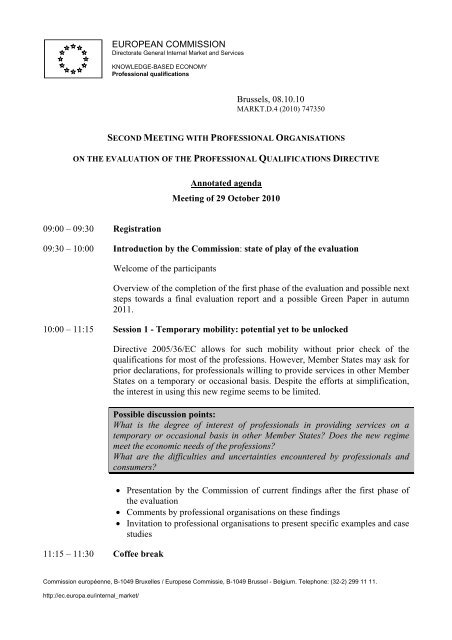
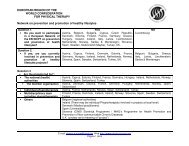
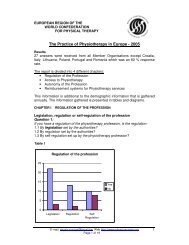
![2 - KNGF Guideline PT in COPD [Compatibility Mode].pdf](https://img.yumpu.com/47587459/1/190x146/2-kngf-guideline-pt-in-copd-compatibility-modepdf.jpg?quality=85)
